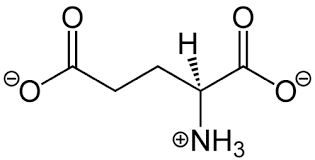There is no strong evidence for MSG having any kind of neurotoxic/neuromodulatory effect.
However, A 2010 article says that, in a double blind trial, it was found that the people who consumed MSG containing soda, reported headache in significantly more numbers compared to the placebo subjects [1]. The concentration of MSG used in this study was 75-150 mg/kg. Assuming that one serving of soda would be 300ml i.e 300g, the amount of MSG consumed would be maximally 45mg, which is much less than glutamate concentration in some natural food stuffs such as tomatoes (~2000mg/kg [2,3]; a tomato that weighs 6oz/~170g contains ~340mg of glutamate). Therefore, I would doubt the findings of this article. The results could have possibly been observed because of some hidden dependent variable (such as the soda formulation).
In general, the USFDA considers MSG as GRAS (generally regarded as safe) [4].
Finally, a 2014 article concludes that dietary MSG would not lead to increase in either blood or brain levels of glutamate [5].
From the Abstract:
The sodium salt of glutamate (monosodium glutamate; MSG) imparts a
savory/meaty taste to foods, and has been used as a flavoring agent
for millennia. Past research on MSG/glutamate has evaluated its
physiologic, metabolic and behavioral actions, and its safety.
Ingested MSG has been found to be safe, and to produce no remarkable
effects, except on taste. However, some recent epidemiologic and
animal studies have associated MSG use with obesity and aberrations in
fat metabolism. Reported effects are usually attributed to direct
actions of ingested MSG in brain. As these observations conflict with
past MSG research findings, a symposium was convened at the 13th
International Congress on Amino Acids, Peptides and Proteins to
discuss them. The principal conclusions were: (1) the proposed link
between MSG intake and weight gain is likely explained by co-varying
environmental factors (e.g., diet, physical activity) linked to the
"nutrition transition" in developing Asian countries. (2) Controlled
intervention studies adding MSG to the diet of animals and humans show
no effect on body weight. (3) Hypotheses positing dietary MSG effects
on body weight involve results from rodent MSG injection studies that
link MSG to actions in brain not applicable to MSG ingestion studies.
The fundamental reason is that glutamate is metabolically
compartmentalized in the body, and generally does not passively cross
biologic membranes. Hence, almost no ingested glutamate/MSG passes
from gut into blood, and essentially none transits placenta from
maternal to fetal circulation, or crosses the blood-brain barrier.
Dietary MSG, therefore, does not gain access to brain. Overall, it
appears that normal dietary MSG use is unlikely to influence energy
intake, body weight or fat metabolism.

